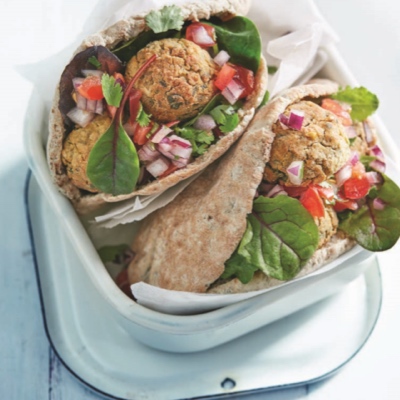
From Football League clubs to world class sports stars like Venus Williams, Tom Daley, David Haye and Lewis Hamilton, its no coincidence that more and more sportspeople are giving up meat and adopting a vegetarian or vegan diet. Anecdotally, many claim that plant-based eating helps their recovery, gives them more energy and reduces their injury rate. While there’s currently no hard scientific evidence to back these claims, most studies have found that eating a vegetarian diet certainly does not put athletes at a disadvantage when it comes to fitness training. But why are more and more athletes noticing performance benefits after switching to a plant-based diet?
It could be that eating a diet rich in fruit, vegetables, whole grains, beans, lentils, nuts and seeds is aiding performance and recovery via its positive effects on the gut microbiota – the population of trillions of microbes that inhabit the gut. In other words, it’s not necessarily the absence of meat that’s helping athletes perform or recover better, rather their higher intake of plant nutrients and lower content of ultra-processed foods that tend to provoke inflammation. We’re talking about fibre, polyphenols and antioxidants – plant chemicals that may help reduce oxidative stress associated with prolonged exercise and modulate immune function and inflammation.
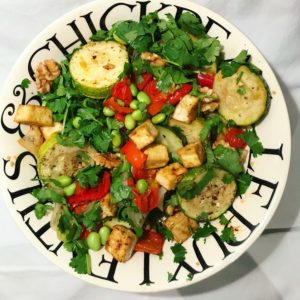 Consuming more fibre – and, importantly, more diverse types of fibre – as well as polyphenols means that you’re feeding the billions of microbes (bacteria, viruses and fungi) in your gut. These microbes break down the fibre we cannot digest ourselves and produce, among other things, short chain fatty acids (acetate, propionate and butyrate) that provide fuel for our intestinal, liver and muscle cells, and have numerous other health benefits. These include increased immunity, less oxidative stress and lower inflammation, all key factors necessary for muscle recovery after exercise. Additionally, butyrate helps regulate energy metabolism, appetite hormones and body composition.
Consuming more fibre – and, importantly, more diverse types of fibre – as well as polyphenols means that you’re feeding the billions of microbes (bacteria, viruses and fungi) in your gut. These microbes break down the fibre we cannot digest ourselves and produce, among other things, short chain fatty acids (acetate, propionate and butyrate) that provide fuel for our intestinal, liver and muscle cells, and have numerous other health benefits. These include increased immunity, less oxidative stress and lower inflammation, all key factors necessary for muscle recovery after exercise. Additionally, butyrate helps regulate energy metabolism, appetite hormones and body composition.
There’s evidence that our gut microbes affect our exercise performance. A comprehensive review of 33 studies concluded that our gut microbiome plays a key role in controlling oxidative stress and inflammatory responses as well as improving metabolism and energy expenditure during endurance exercise. In one 2014 study, athletes who took a probiotic supplement for four weeks were able to exercise longer before reaching fatigue than those who took a placebo.
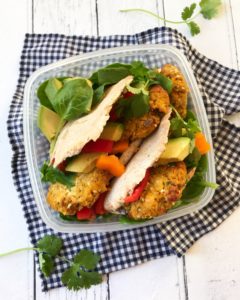 Only one study to date has looked directly at how gut microbiota affects exercise performance. Unfortunately, this was carried out with mice, not humans, but it found that those with a healthy microbiota had were able to exercise longer than those who didn’t.
Only one study to date has looked directly at how gut microbiota affects exercise performance. Unfortunately, this was carried out with mice, not humans, but it found that those with a healthy microbiota had were able to exercise longer than those who didn’t.
On a low-fibre diet, healthy species of gut microbes starve, the intestinal wall becomes more permeable and the protective mucous layer coating the intestines gets thinner, making it easier for harmful bacteria and toxins to cross from the gut into the bloodstream (sometimes called ‘leaky gut’). This causes your immune system to go into overdrive, resulting in low-level or chronic inflammation not only in the gut but throughout the body, which not only puts you at greater risk of chronic diseases like heart disease, stroke and type 2 diabetes but can also increase fatigue during endurance exercise and hamper your recovery afterwards.
A fibre-rich diet, on the other hand, results in a proliferation of healthy microbe species, a healthier gut microbiota and less inflammation in the body. A meta-analysis of 18 previous studies found that people who consumed a vegetarian diet for at least two years had lower levels of inflammation (as measured by lower blood levels of C-reactive protein) than those who ate an omnivorous diet, suggesting that plant-rich diets have an anti-inflammatory effect on the body. A 2019 review of studies points to the benefits of foods rich in anthocyanins (a subclass of polyphenols found in fruit and vegetables) for increasing the population of beneficial gut microbes, while at the same time inhibiting the harmful species.
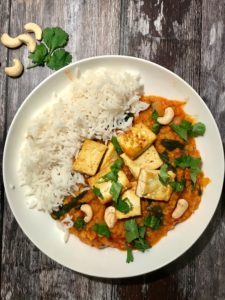 In other words, a healthy gut microbiota is critical for optimal performance and recovery as well as health. It is also associated with a more favourable body composition, which roughly translates into faster times and better athletic performance.
In other words, a healthy gut microbiota is critical for optimal performance and recovery as well as health. It is also associated with a more favourable body composition, which roughly translates into faster times and better athletic performance.
The best way to increase the diversity of your ‘healthy’ gut microbes is to eat a wide range of foods rich in fibre, polyphenols and probiotics. These provide ‘food’ for them, enabling these microbes to multiply. There are many types of fibre and the more types you eat, the greater the benefit.
Plant-based foods Try to get as many different kinds of fruit, vegetables, whole grains, pulses, nuts and seeds in your diet as possible. Variety is key because each contains different nutrients that the gut microbes thrive on.
Berries, nuts and cocoa (and even red wine!) contain polyphenols that encourage the growth of ‘healthy’ microbes
Fermented foods containing probiotics These include yogurt, sauerkraut (fermented cabbage), miso (a fermented soya bean paste), tempeh (fermented soya beans), kefir (a fermented milk drink), kombucha (fermented tea) and kimchi (fermented Chinese cabbage), and will have a short-term beneficial effect on your gut microbiota (it lasts only as long as you are eating these foods regularly)
Eating prebiotic foods will help promote ‘healthy’ microbes. These include inulin and fructo-oligosaccharides that are found in onions, garlic, leeks, chickpeas, beans and lentils.
Avoid highly processed foods They contain ingredients, such as emulsifiers, that either suppress ‘healthy’ microbes or increase ‘unhealthy’ species.
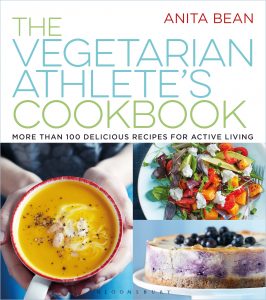 If you enjoyed this post and want to find out more about food and nutrition, as well as some easy and tasty meal inspiration, then The Vegetarian Athlete’s Cookbook – More than 100 recipes for active living (Bloomsbury, 2016) is a great place to start. It features:
If you enjoyed this post and want to find out more about food and nutrition, as well as some easy and tasty meal inspiration, then The Vegetarian Athlete’s Cookbook – More than 100 recipes for active living (Bloomsbury, 2016) is a great place to start. It features:
More than 100 delicious, easy-to-prepare vegetarian and vegan recipes for healthy breakfasts, main meals, desserts, sweet and savoury snacks and shakes.
- Expert advice on how to get the right nutrients to maximise your performance without meat
- Stunning food photography
- Full nutrition information for each recipe, including calories, carbohydrate, fat, protein and fibre

